
Childhood abuse survivors return to the Oregon farm they once called home in E.M. Lewis’s compact dramatic gem Apple Season, a National New Play Network Rolling World Premiere now riveting audiences at Atwater Village Theatre.
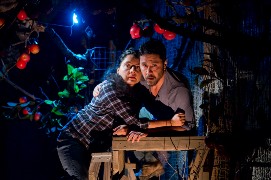 It’s been twenty-five years since Roger Fogerty (Justin Huen) and his sister Mary Elizabeth (Liza Fernandez) fled their monster of a father for parts unknown.
It’s been twenty-five years since Roger Fogerty (Justin Huen) and his sister Mary Elizabeth (Liza Fernandez) fled their monster of a father for parts unknown.
Roger, now 41, has spent the past quarter century as a Wyoming farm hand, his possessions limited to what he can fit into a small leather satchel, Louis L’Amour paperbacks his only companion.
“Lissie,” two years younger, first found refuge at her Aunt Gabriela’s where she completed high school, then went on to college, and eventually settled in to teach fourth grade in a small Oregon town four hundred miles from where she and her brother grew up.
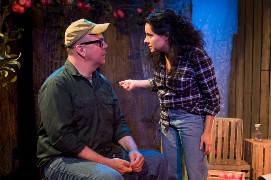 Roger has just boarded a train back to Wyoming following his father’s funeral when Will Rizzle (Rob Nagle), his best and possibly only childhood friend, shows up at the Fogerty apple orchard in hopes of convincing Lissie to sell him the family acreage.
Roger has just boarded a train back to Wyoming following his father’s funeral when Will Rizzle (Rob Nagle), his best and possibly only childhood friend, shows up at the Fogerty apple orchard in hopes of convincing Lissie to sell him the family acreage.
As “Billy Rizz” is soon to discover, the younger Fogerty has her own plans for the house she once called hell.
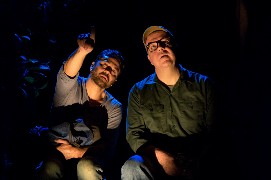 Over the course of Apple Season’s brief but just-right seventy minutes, playwright Lewis transports us seamlessly back and forth from the present to the distant and not-so-distant past, allowing us glimpses into Lissie and Roger’s childhood terrors, Roger’s high school friendship with Billy, and the older sibling’s train ride to the funeral home where his father’s body awaits burial.
Over the course of Apple Season’s brief but just-right seventy minutes, playwright Lewis transports us seamlessly back and forth from the present to the distant and not-so-distant past, allowing us glimpses into Lissie and Roger’s childhood terrors, Roger’s high school friendship with Billy, and the older sibling’s train ride to the funeral home where his father’s body awaits burial.
Meanwhile, in the present day, Lissie and her brother’s bestie seem poised to rekindle romantic flames first ignited with a high school kiss, fires that still smolder today, twenty-five years later.
There’s not an ounce of fat on Lewis’s lean marvel of a script, one certain to resonate with anyone who’s experienced abuse, physical, sexual, or emotional, as well as to those who somehow managed to survive their childhood unscathed.
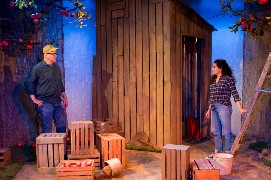 Darin Anthony directs three superb actors beginning with the always extraordinary Nagle, following The Little Fox’s despicably despotic Oscar Hubbard, The Judas Kiss’s hearbreakingly broken Oscar Wilde, and Sucker Punch’s feisty South London boxing trainer Charlie Maggs with yet another hundred-eighty-degree turn as salt-of-the-earth-personified Billy.
Darin Anthony directs three superb actors beginning with the always extraordinary Nagle, following The Little Fox’s despicably despotic Oscar Hubbard, The Judas Kiss’s hearbreakingly broken Oscar Wilde, and Sucker Punch’s feisty South London boxing trainer Charlie Maggs with yet another hundred-eighty-degree turn as salt-of-the-earth-personified Billy.
Fernandez’s wounded but still-standing Lissie is riveting throughout, an acting feat made even more remarkable when a post-performance chat reveals the actress’s Australian voice, not a trace of which is heard in Lissie’s small-town Oregon vowels.
Huen completes the Apple Season cast to touching, aching, perfection, playwright Lewis taking inspired advantage of Fernandez and Huen’s Latino roots to transform the Fogerty siblings from white-bread (as they were originally written) to biracial, snippets of inserted Spanish a reminder of the mother they have loved and lost.
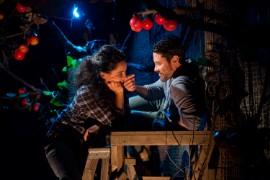 Scenic designer Stephanie Kerley Schwartz’s orchard set is so gorgeously picturesque you can almost taste the apples, flashback sequences would not be nearly as effective without Martha Carter’s exquisite lighting design transitions, and Warren Davis’s evocative sound design and Cece Tio’s just-right costumes complete as fine a production design as you’ve seen on a matchbox stage.
Scenic designer Stephanie Kerley Schwartz’s orchard set is so gorgeously picturesque you can almost taste the apples, flashback sequences would not be nearly as effective without Martha Carter’s exquisite lighting design transitions, and Warren Davis’s evocative sound design and Cece Tio’s just-right costumes complete as fine a production design as you’ve seen on a matchbox stage.
Kirsten Turkle is stage manager and costume design assistant Tio, who has produced Apple Season for Moving Arts. Ronnie Clark is combat consultant. Michael Kalisz is scenic design assistant.
Playwright Lewis, too long absent from our L.A. stages, could not have asked for a finer production of her latest dramatic gem, nor could SoCal audiences, than its moving Moving Arts World Premiere. Tart as a Granny Smith, Apple Season is one of the summer season’s dramatic best.
Atwater Village Theatre, 3269 Casitas Ave., Los Angeles.
www.movingarts.org
–Steven Stanley
July 22, 2018
Photos: Benjamin Simpson
Tags: Atwater Village Theatre, E.M. Lewis, Los Angeles Theater Review, Moving Arts



 Since 2007, Steven Stanley's StageSceneLA.com has spotlighted the best in Southern California theater via reviews, interviews, and its annual StageSceneLA Scenies.
Since 2007, Steven Stanley's StageSceneLA.com has spotlighted the best in Southern California theater via reviews, interviews, and its annual StageSceneLA Scenies.







 COPYRIGHT 2025 STEVEN STANLEY :: DESIGN BY
COPYRIGHT 2025 STEVEN STANLEY :: DESIGN BY